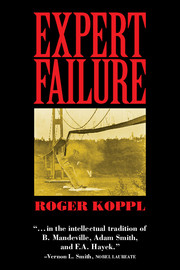
-
Select format
-
- Publisher:
- Cambridge University Press
- Publication date:
- 01 February 2018
- 08 February 2018
- ISBN:
- 9781316481400
- 9781107138469
- 9781316503041
- Dimensions:
- (228 x 152 mm)
- Weight & Pages:
- 0.54kg, 290 Pages
- Dimensions:
- (228 x 152 mm)
- Weight & Pages:
- 0.44kg, 290 Pages
You may already have access via personal or institutional login
Book description
The humble idea that experts are ordinary human beings leads to surprising conclusions about how to get the best possible expert advice. All too often, experts have monopoly power because of licensing restrictions or because they are government bureaucrats protected from both competition and the consequences of their decisions. This book argues that, in the market for expert opinion, we need real competition in which rival experts may have different opinions and new experts are free to enter. But the idea of breaking up expert monopolies has far-reaching implications for public administration, forensic science, research science, economics, America's military-industrial complex, and all domains of expert knowledge. Roger Koppl develops a theory of experts and expert failure, and uses a wide range of examples - from forensic science to fashion - to explain the applications of his theory, including state regulation of economic activity.
Reviews
‘If you are skeptical of elitist experts, cronies in government or business, but fearful of the populist uprising against them, you will like reading this book in the intellectual tradition of B. Mandeville, Adam Smith, and F. A. Hayek.'
Vernon Smith - Nobel Laureate, Professor of Economics and Law, Chapman University, California
‘The burgeoning literature on expertise, which crosses several disciplines, has needed an accessible, sophisticated, critical, synthetic overview that explains the importance of the issues. Roger Koppl has supplied one at last, and much can be learned from it.'
Stephen Turner - Distinguished University Professor, University of South Florida
‘In this lucid and wide-ranging examination, Roger Koppl sets forth several lines of thought that speak to this servant-master dichotomy. The book does not provide a recipe for creating servants and avoiding masters, but it provides a cogent framework for exploring this problem of human governance, closing with the wisdom: value expertise but fear expert power.'
Richard Wagner - Harris Professor of Economics, George Mason University, Washington, DC
'The growth of the administrative state, more intricate financial regulation, and the spread of behavioral economics as a basis for policy means that we are increasingly living under the rule of experts. Roger Koppl's book is an in-depth look at the epistemic and incentive problems created by what may appear to some as simply evidence-based policy. But much more is at stake here as Koppl revealingly demonstrates.'
Mario J. Rizzo - Associate Professor of Economics, New York University
'In Expert Failure, Roger Koppl has written a commanding synoptic and authoritative book on the fundamental problem of 'experts', when knowledge is not uniformly distributed. Koppl argues for polyarchy over hierarchy, covering an enormous range from Socrates, to the administrative state, to the tacit knowledge in the economy and the dangers of the 'entangled deep state'. Read this book.'
Stuart Kauffman, FRSC - Emeritus Professor, University of Pennsylvania
Contents
Metrics
Altmetric attention score
Full text views
Full text views help Loading metrics...
Loading metrics...
* Views captured on Cambridge Core between #date#. This data will be updated every 24 hours.
Usage data cannot currently be displayed.
Accessibility standard: Unknown
Why this information is here
This section outlines the accessibility features of this content - including support for screen readers, full keyboard navigation and high-contrast display options. This may not be relevant for you.
Accessibility Information
Accessibility compliance for the PDF of this book is currently unknown and may be updated in the future.


